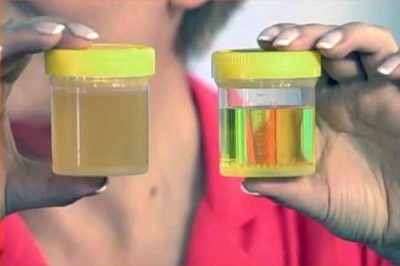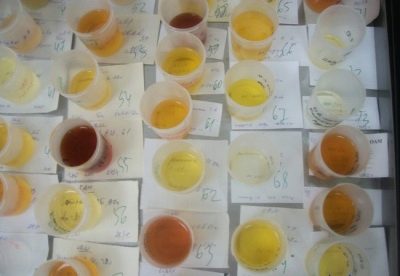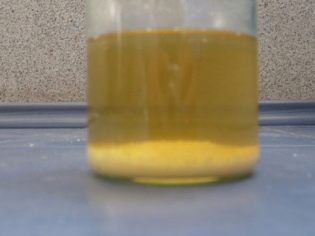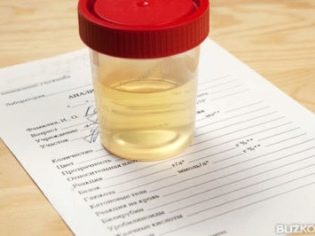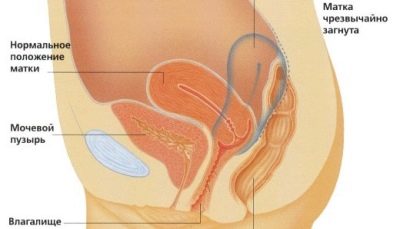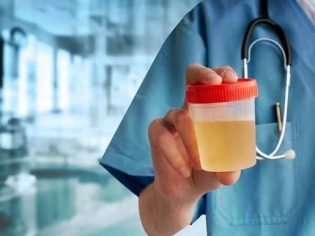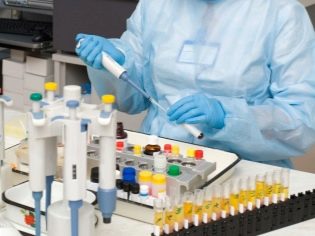What to do if urine is turbid during pregnancy?
Urinalysis - the most frequent during pregnancy. His woman gives before each visit to the doctor. Any changes in the composition of the secreted fluid can tell a lot to the doctor about the state of health of the future mother and the baby she is carrying.
In this article we will talk about why the urine of a pregnant woman becomes turbid, and what to do in this situation.
Urine transparency
This criterion is necessarily evaluated by laboratory technicians during a general analysis. Normally, the liquid secreted from a healthy adult should be completely transparent to all shades of yellow - from delicate straw to bright amber. Neither sediment nor extraneous inclusions in the liquid should be.
Turbid urine laboratories call urine with incomplete transparency. The transparency of the excreted fluid is lost when there are certain substances in it. The kidneys remove with the liquid everything that the body ceases to be needed - waste products, salts, toxins and even epithelial cells, which died off according to their physiological life cycle.
The content of all these substances that have become unnecessary for the body and cells in the urine, which consists of more than 90% water, is not noticeable to the eye. If for a number of reasons, the quantitative content of impurities does not change in a big way. This is how turbidity arises, which causes so many questions in expectant mothers.
Causes of turbidity
Turbid fluid excreted by the kidneys during pregnancy can be a sign of a woman’s lack of knowledge of the rules for analyzing or ignoring them. So, if it is bad to wash the external genitalia, vaginal secretion may get into the sample of the morning urine, and the transparency of the sample will be lost.
If you take the jar to the laboratory for more than 2 hours, a white precipitate may form at the bottom of the container with the liquid. With shaking, the liquid will also cease to be clear.
The precipitate at the bottom of the jar is uric acid. That is why It is recommended to deliver the collected liquid to the laboratory test as soon as possible.
Such turbidity is not a pathological sign. However, turbidity of the liquid immediately after collecting or collecting already turbid liquid is difficult to call normal. Transparency is often lost due to internal irregularities. Here are some of their possible causes.
The salt
A large amount of phosphorus, calcium in the urine, phosphates, urates and oxolates can make the excreted fluid turbid or completely cloudy, like milk.
In the secondary urine, which is what a woman collects for laboratory testing, all these impurities can get in if the kidneys do not cope well with their functions, if there are inflammatory diseases of the urinary tract. In pregnant women, the amount of excreted salts is physiologically reduced, because many of these compounds are used to form the skeleton of a child.
An increase in the salt content in the urine is an alarming symptom. However, a decrease in phosphate also causes turbidity in the fluid excreted from the body.
Bacteria and blood cells
In case of bacterial inflammation in the body, part of the pathogen specimen penetrates through the renal filters into the urine, so it becomes cloudy.Among the blood cells in the excreted fluid most often are red blood cells and white blood cells.
Increased or decreased acidity of urine
Both excessively acidic and alkaline conditions can affect the transparency of the released fluid. Acid imbalance can be associated with kidney disease or thyroid problems.
Low acidity can talk about potassium deficiency in the body of the future mother.
Concentration
Urine may be turbid in women who drink little fluids, experience dehydration. For example, if the expectant mother in the first trimester, there is a strong toxicosis, flowing with vomiting.
The less urine in general is released, the more concentrated it is, the more likely it is that it will lose its transparency.
In the second and third trimester, turbid urine is more common than in the early stages. This is due to the pressure that the uterus has grown on the kidneys and ureters. On any month of pregnancy, detection of turbid urine is a reason for an unscheduled visit to the doctor. Do not wait for the next admission: the sooner the true cause of what is happening is found, the better it will be for everyone.
Diagnostics
In addition to transparency, the color and smell of the emitted liquid are of great importance. If it not only dimmed, but also changed its normal color, and also acquired an unpleasant, pungent odor, this could indicate a serious inflammatory process in the kidneys or different parts of the urinary tract.
Depending on which department is affected, mucus, erythrocytes, leukocytes can be found in the liquid. Accurate quantification occurs in the laboratory.
To detect urates, the sample is heated. Turbid liquid becomes completely transparent, like a tear, when it is heated, if it contains these salts.
If there are carbonate salts in the urine, then this allows the installation of acetic acid. It in certain quantities is added to the sample. If foam appears and the color changes, problems lie in carbonate compounds.
The amount of uric acid is indicated by reactions that occur in vitro when combined with hydrochloric acid. But the blood cells are determined, as they say, by eye - that is, microscopically. Red blood cells and white blood cells are counted "manually". To establish bacteria in the secreted fluid allows bakposev.
If only the morning portion becomes cloudy, and all the rest are within the normal range, there is most likely nothing to worry about. Just the morning excreted liquid is always more concentrated than the next portions. But for an evening dress the turbid liquid is not peculiar, in norm by the evening it becomes more transparent.
Danger
Turbidity in itself is not dangerous. The consequences of ignoring the true causes that led to the loss of transparency can be dangerous. Thus, an excess of salts can cause the development of urolithiasis and a very dangerous condition - kidney stones.
Untreated inflammation of the kidneys or urinary tract, as a result of which the fluid became turbid due to bacteria or leukocytes in it, can be complicated and turn into a chronic lesion.
Hormonal disbalancewhich can also be “signaled” by the nature of the excreted fluid, and is completely dangerous by the fact that hormones or their deficiency can affect not only maternal health, but also the health of the baby.
In the early stages it is dangerous miscarriage, in the late - premature birth. At any time hormonal imbalance is dangerous the possibility of the death of the baby.
Treatment
Not always turbid urine is a reason for serious medical treatment. Sometimes a doctor who sees the data from the laboratory will be enough to adjust the future mom's diet.
When excess salt in the urine recommended sparing diet. Smoked dishes, pickles and pickles, an abundance of spices, fried and spicy foods are removed from the diet of a pregnant woman. The use of edible salt is reduced to a minimum.
It is useful to change the drinking regime, to make sufficient the use of the most ordinary clean drinking water. If a woman has a tendency to the formation of edema, the exact amount of water per day should be discussed with your doctor.
If there is no preeclampsia, it is permissible to drink up to 2 liters per day. Well helps to normalize the water-salt balance birch sap. But not the one that is sold in all three-liter jars in all food stores. This is a real birch period, which is mined in the spring. It should be drunk without adding sugar. To the aid of a pregnant woman in the fight with salts in the urine comes celery juice.
When bacteria and blood cells are detected in the urine, an additional examination is required, it is also advisable to do an ultrasound of the kidneys and bladder and visit a nephrologist.
When pyelonephritis, cystitis and other unpleasant inflammatory diseases of the urinary system are detected, treatment is appropriate for the particular diagnosis. It usually includes diuretics, vitamins, anti-inflammatory drugs and physiotherapy. Sometimes there is a need to use antibiotics, which the doctor chooses for the future mother.
In the diet of the pregnant in this case add protein foods - meat and fish, eggs, beets and potatoes. The ban on spicy, smoked, fried and fatty is preserved. It is also not recommended to use a large amount of cottage cheese and dairy products.
Despite the numerous tips of traditional medicine, which offer the expectant mother to quickly get rid of turbidity, all decoctions and herbal tea should be used only after discussing their prescriptions with your doctor - many herbs that are very useful for non-pregnant people, can greatly harm while waiting for the child.
Turbidity on the background of toxicosis in pregnant women, observed for up to 12 weeks, needs a gynecologist's consultation, which will help you choose the right drinking regimen and diet in order to eliminate dehydration and minimize the effects of vomiting in the first trimester.
Muddy light urine with whitish flakes in the later stages may indicate an increased protein content, which in some cases does not require any treatment if there are no other symptoms of preeclampsia.
Turbidity on the background of hormonal failure requires mandatory consultation of an endocrinologist, to which a woman will be advised to go with the results of a blood test for hormones. As a rule, the color and transparency of the excreted fluid return to normal after the pregnant woman is prescribed the appropriate treatment aimed at normalizing the hormonal background.
The fluid excreted by the kidneys is very individual in composition and depends on medicines, food products that the expectant mother eats, chronic diseases that are in history, and many other causes and factors. Treatment in each case is also assigned individually.
Next, we recommend to watch a video from which you will learn what the color of urine says.
Prevention
To avoid problems with the kidneys and urinary system, a woman “in position” will be able, if from the very beginning of the term of carrying a child, it is the rule to eat right, not to overeat, not to “get carried away” with prohibited foods.
If a woman before conception had problems with the health of her kidneys or bladder, she should notify her obstetrician-gynecologist about this already during her first visit to the doctor about the pregnancy.
Pregnant should pay more attention to personal hygiene, preventing bacteria from the rectum from penetrating the external genital organs and from there to the urogenital system.
When a sample is taken for analysis, it is necessary to wash well and close the vaginal opening with a cotton swab so that no impurities can get into the sample, which can not only disrupt the urine, but also change its composition.

